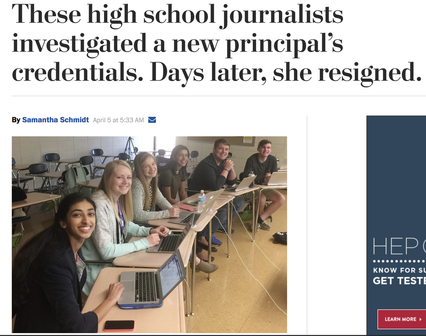 A screenshot of the Washington Post story about the team of student reporters who uncovered the truth about their new principal. A screenshot of the Washington Post story about the team of student reporters who uncovered the truth about their new principal. I woke up this morning to multiple social media notifications from friends tagging me to make sure I saw this story in the Washington Post. The article details how a group of six student reporters for the Booster Redux at Pittsburg High School in southeastern Kansas started researching their new principal and uncovered some major discrepancies in her educational record, which eventually led to her resignation. You can (and should!) read the story for specific details about what they uncovered, but for me the story reaffirmed how crucial it is for students to be empowered to be investigators and watchdogs, not just public relations tools. We know how crucial it is for students to learn to be critical thinkers. In a 2014 article about "agnotology, a neologism signifying the study of the cultural production of ignorance," reporter Michael Hiltzik interviewed Robert Proctor, a Stanford professor and leading expert in this area. Proctor described how ignorance can be profitable, such as with the tobacco industry's "goal was to erode public acceptance of the scientifically proven links between smoking and disease," according to the article "In the words of an internal 1969 memo legal opponents extracted from Brown & Williamson's files, 'Doubt is our product.' Big Tobacco's method should not be to debunk the evidence, the memo's author wrote, but to establish a 'controversy.'"
This erosion of trust in science, combined with ongoing political spin to sell ideologies on both sides, means critical thinking is especially important for students to learn today. As I argued in an earlier post, an understanding of truthfulness is not partisan; it is foundational to a healthy democracy. So how do we help students be great investigative reporters? "I think there's too much emphasis on speed and feeding the impatience people have," Bob Woodward, most famous for nation-changing exposure of the Watergate scandal with Carl Bernstein, said in an 2011 appearance at Poynter. "In many ways, journalism is not often enough up to the task of dealing with the dangerous and fragile nature of the world, or the community, or anything you might try to understand." Time and teamwork are the keys, I believe, to this deeper level of great journalism. Some stories have to be written, edited and published quickly. That's a reality. But deeper stories, stories that dig into what is important, need more. These student journalists worked as a team over the course of several weeks to uncover and verify the truth – and adults were part of that team. Their adviser recused herself because she had been on the hiring committee for the principal, according to Schmidt's article, so students reached out to journalism professionals. The account of their process by journalism professor Jonathan Peters provides insight into his partnership with the students. His account reveals more details about how the students took the time to dig into the research, verify their information, seek guidance and publish ethically. They also live in Kansas, a New Voices state where high school journalists are protected from administrative censorship, and the article notes that their superintendent, Destry Brown, was supportive throughout the process, though he stood behind the principal until her missing credentials were fully revealed and she resigned. As I head to the spring National High School Journalism Convention this weekend in Seattle, I'm thinking about how I can build more opportunities for time and teamwork into my own students' reporting. It's so easy to get caught up in the speed and quantity game, especially for those of us advising online-only publications, but Woodward is right: our world can be fragile and dangerous. Slowing down and asking for help along the way is how we get real answers. Correction: I updated this post on April 7, 2017, to add a link to the CJR article by Jonathan Peters and to remove my initial suggestion that the superintendent deserves an administrative JEA award, given that Peters' account of his work with the students indicates that Brown's support was more a result of the state law than explicit support for student journalism.
1 Comment
|
About“And though she be but little, she is fierce!” -A Midsummer Night’s Dream Archives
December 2020
Categories
All
|

 RSS Feed
RSS Feed